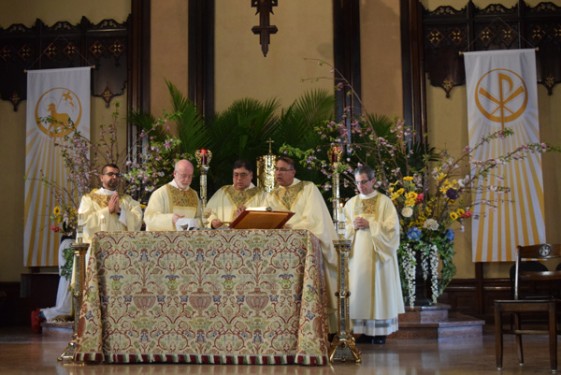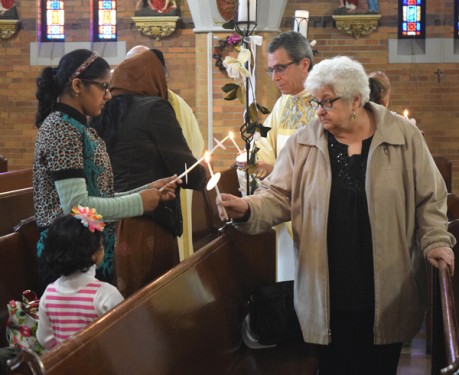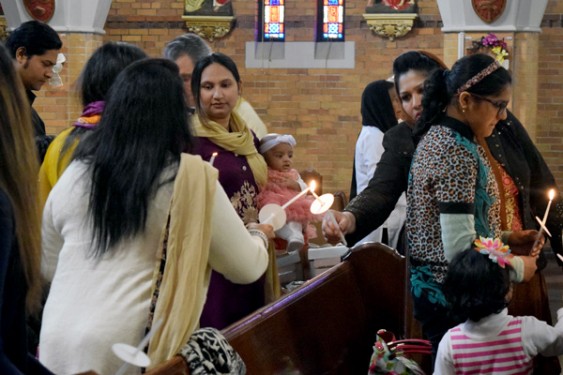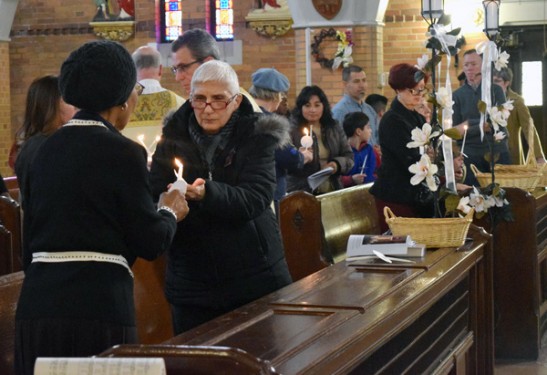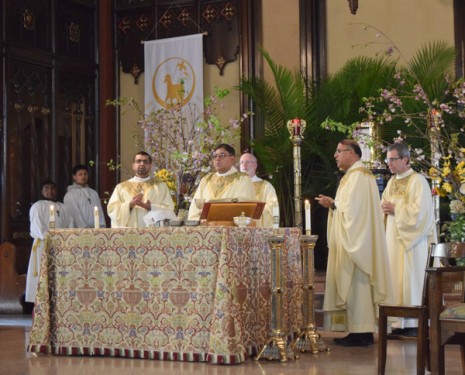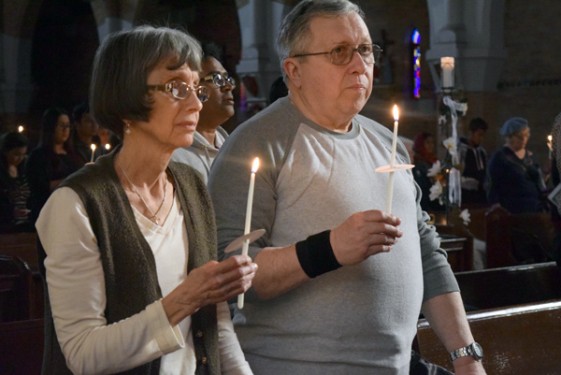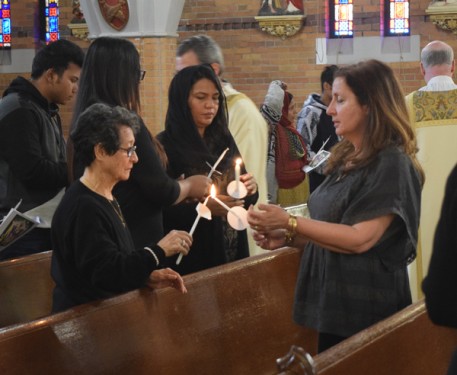 Following the Easter Sunday terrorist attacks that killed 74 people and injured nearly 400 more in a public park in Pakistan, local Pakistanis prayed for healing in their country, for the victims, their families and the terrorists themselves.
Following the Easter Sunday terrorist attacks that killed 74 people and injured nearly 400 more in a public park in Pakistan, local Pakistanis prayed for healing in their country, for the victims, their families and the terrorists themselves.
Father Ilyas Gill, director of Pakistani outreach for the diocese, organized the bilingual Mass and prayer service at Immaculate Heart of Mary Church, Windsor Terrace. A considerable amount of English-speaking people were also in attendance.
Father Gill said it is important to pray for violent radicals “so that God can change their hearts so that they can build the kingdom of God… There is evil all around the world, but our job as people is to promote forgiveness, peace and love around the world.”
Father Emmanuel Yousaf, from the Pakistani Conference of Catholic Bishops, came to Brooklyn from his home country after stopping at the United Nations in Geneva.
Pakistan Tahreek Taliban has claimed credit for the attack, saying it was carried out against Christians on their feast day. However, Father Yousaf said the attack killed people of all religions who were in the public park in Lahore that day, including Muslims who make up over 96 percent of the country’s population, and caused immense pain to all the country.
“All Pakistanis living there have become victims of these terrorists attacks,” he said. “I do not want to blame them (the terrorists) for everything. I want to pray for them, who have hatred in their heart.”
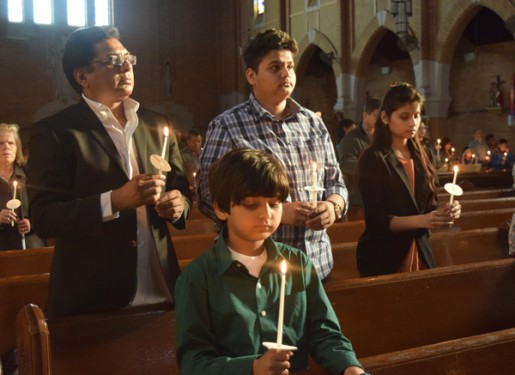 Father Nasir Gulfam, a Pakistani priest in the Diocese of Rockville Centre, said prayers helped his family when they needed it most. His cousin and three nephews were in the park when the terrorists struck. In the violence, his cousin was struck with a fiery ball of debris to the head. His pre-teen nephews were able to get their father to the hospital amid the chaos.
Father Nasir Gulfam, a Pakistani priest in the Diocese of Rockville Centre, said prayers helped his family when they needed it most. His cousin and three nephews were in the park when the terrorists struck. In the violence, his cousin was struck with a fiery ball of debris to the head. His pre-teen nephews were able to get their father to the hospital amid the chaos.
As his cousin was laying in the hospital, the family was made aware of prayers that were coming in from Europe and America for the victims of the attacks. Father Gulfam believes it was these prayers that helped his cousin survive his coma and eventually be discharged from the hospital.
“We have to be united. We need to work for peace,” Father Gulfam said. “Thank you very much for your prayers.”
“This service means a lot to me and my country,” said Raja Ali Ejaz, Consul General of Pakistan in New York. “So I would like to express my gratitude.”
“Terrorists do not have a religion,” he said. “They carry out these acts to inflict pain on human beings.”
He assured those present that his government is taking swift, military action against terrorism, especially in the area where the attacks occurred. He said, so much is happening, that he has confidence that the terrorists will be found and held accountable for their actions.
Father Yousaf said he is pleased to hear this resolve from the consul general.
“The government should take up the challenge,” he said. “All of us have to become very serious.”
Over the past 20 years, Pakistan has seen a rise of terrorism and violent hate against Christians. Christians have been burned alive, their homes and entire villages have been burned and their churches attacked. Father Yousaf said feeling a sense of danger has become a normal part of the Pakistani Christian life. He said the sentiment among the people has become to cling on to the example of the Cross.
“Everyone has to die (eventually), so if we die in the house of the Lord, it is a blessing,” he said.
He said people have not been deterred from their faith due to the terrorists. They continue to attend Mass. In order to protect them the Church has trained local young men to serve as guards during services. They do not carry weapons but they know the congregation and are trained to spot trouble.
“During Easter, there were two attacks planned,” Father Yousaf said. “One of the boys we trained – he caught one of the suicide bombers” at St. Anthony’s Church in Lahore.
Another danger Christians face, according to Father Yousaf, is misuses of strict blasphemy laws. He said nearly anyone could go to a temple and accuse someone of blasphemy prompting the temple to send out a message through its PA system urging the community to go out and apprehend, or kill, the accused.
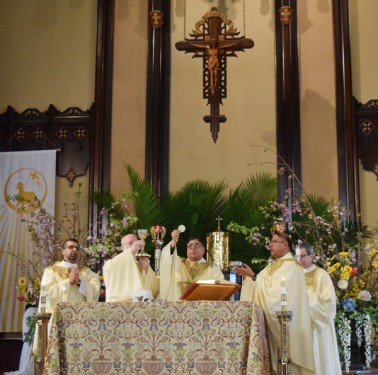 Living in such a world can be difficult, especially for young people, Father Yousaf said. The Church encourages the youth to pursue a higher education. However, this creates tension. So Father Yousaf said he tries to direct the young people not to engage when their counterparts provoke them and try to convert them. Instead he urges them to live the quiet example of the Gospel in their lives.
Living in such a world can be difficult, especially for young people, Father Yousaf said. The Church encourages the youth to pursue a higher education. However, this creates tension. So Father Yousaf said he tries to direct the young people not to engage when their counterparts provoke them and try to convert them. Instead he urges them to live the quiet example of the Gospel in their lives.
“Do well what you do, and do it with your heart,” he said. “Living the Gospel in your life is more effective then shouting what it says.”
Father Yousaf said he sees his role as helping promote the good of all of Pakistan by following Jesus’ example and helping anyone in need, not just Catholics.
Part of the way Father Yousaf works to promote the common good of his country is by lobbying his government and the international community. He said his organization, National Commission for Justice and Peace, has made many recommendations to the government including how to help prevent the misuse of blasphemy laws. The government has not responded.
This is why Father Yousaf said he is not convinced that the government is truly dedicated to eradicating terrorism.
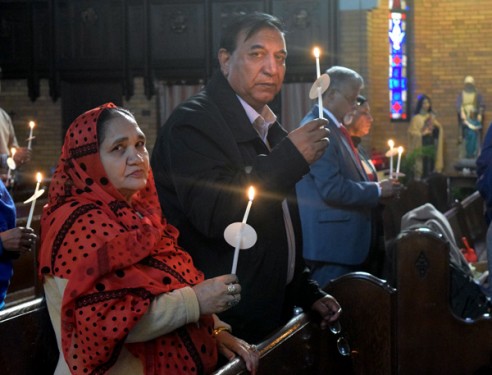 He said terrorism has become infused in the general society over the past two decades. Individuals in the government and in many sectors of society have become sympathetic to the terrorist’s cause, he said. But there has been some change lately, Father Yousaf explained.
He said terrorism has become infused in the general society over the past two decades. Individuals in the government and in many sectors of society have become sympathetic to the terrorist’s cause, he said. But there has been some change lately, Father Yousaf explained.
In 2014, a military public school in Peshawar was attacked, killing 145 people, mostly children. Since then, the military has been more inclined to fight terrorism and has urged the government to do so, Father Yousaf said.
As to the consul general’s presence and statements at Immaculate Heart of Mary Church, Father Yousaf said he is pleased that he seems to be open to respectful dialogue.
“We are in the dark, but I see the light,” he said.

